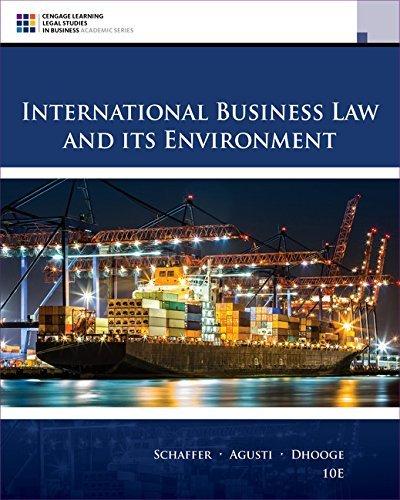All of us understand that the law is a floor for judging our behavior, an absolute minimum
Question:
1. You have been negotiating with a representative of a government in Africa to sell products for a new state building project in his country. The negotiations are finalized during your trip to his offices in Africa. After easily negotiating a fixed price and delivery, he "suggests" that you prepare a price quotation on a "pro forma invoice"-at double the negotiated price. His government will pay the full amount shown on the invoice through a foreign bank, and your firm will pay him the difference as a "commission" in U.S. dollars deposited to his personal bank account in New York. He convincingly argues that this practice is customary in his country. The temptation for you is great; the deal would be a profitable one. Should you make the payment? Does it matter that it is customary in his country? Do you think it is lawful under American law? Does it matter that this is taking place in Africa, far from the United States? Is there a "victim" in this case?
2. Your company intends to locate a plant in Mexico to manufacture tires for sale in both Mexico and the United States. If the plant were in the United States, the laws would require expensive safeguards to protect the health and safety of U.S. workers, as well as the added cost of minimum wage rules, Social Security contributions, health insurance, retirement benefits, and other employee benefits. Assume that Mexican law is not so strict, that wages and operating costs are less, and that benefit programs are either nonexistent or far less costly. To what extent should you conform to the legal standards applicable in the United States? Should you comply with American labor rules and environmental rules, even though they are not enforceable in Mexico? After all, should not all workers be safe from harm? Does not polluted air in Mexico travel to the United States? Do you think that any firm operating in a host country should carry with it the ethical codes of its home country? What about competition from firms in Japan or Germany that are operating their plants in Mexico? If they don't comply with American labor and environmental standards in Mexico, how will you compete with them? How does the international manager justify decisions in cross-cultural situations?
3. You are an international manager for a U.S. apparel designer that sells to major U.S. department stores and retailers. Several years ago, your firm decided to have clothing sewn in India and Pakistan, which resulted in tremendous cost savings over having the work done in the United States. In making the decision, the firm considered its impact on U.S. families who depend on the income from these jobs. It opted for the cost savings, seeing its responsibility to produce a profit for shareholders as more important than its responsibility to provide jobs in the United States. Now, however, it finds that its contractor in India is overworking and abusing child labor in violation of internationally accepted standards for the treatment of children in the workplace. The Indian government shows little interest in policing its own labor practices. The sad story of the Indian children runs on national television and appears in the national press. What course of action should you take? If you decide to discontinue working with sewing contractors in India, do you do so to protect Indian children, because of the adverse publicity in the United States, or for both reasons? What do you expect the reaction would be from shareholders? From consumers?
4. While your answer to this question may have to wait until the next chapter, do you think that a written corporate code would aid a manager in resolving these conflicts and in making difficult choices? How would a corporation draft such a code, and what sources would it draw on?
Corporation
A Corporation is a legal form of business that is separate from its owner. In other words, a corporation is a business or organization formed by a group of people, and its right and liabilities separate from those of the individuals involved. It may...
Fantastic news! We've Found the answer you've been seeking!
Step by Step Answer:
Related Book For 

International Business Law And Its Environment
ISBN: 9781305972599
10th Edition
Authors: Richard Schaffer, Filiberto Agusti, Lucien J. Dhooge
Question Posted:





